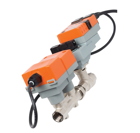Fan-coil units come pre-commissioned

Advanced Air can now deliver fan-coil units that are pre-commissioned in the factory with the setpoints for water and airflow established so there is no need for any on-site commissioning. The company has entered into an agreement with Belimo and Advanced Air’s control specialist to design and develop a simple EPIV/Delta control package (EPIV is an electronic pressure-independent valve).
Compared to the current pressure-independent control valve (PICV), the EPIV/Delta system has no strainers, no Binder test points, no complicated pipework — and no commissioning. The EPIV does not need pressure to operate it, unlike the 10 to 20 kPa required by a PICV, so there is a potential energy saving with lower-pressure and smaller pumps.
The unit is fully addressable from a handheld device to check if the preset values are being achieved, even without the BMS being operational. Changes to the settings can be made by the handheld unit, and all information is communicated to the BMS when it is fully operational.
Andrew Sargent, Advanced Air’s general manager, believes that the EPIV /Delta will revolutionise the fan-coil market because the control system has single-point responsibility — the fan-coil manufacturer — and offers huge benefits to the designer and installer.







